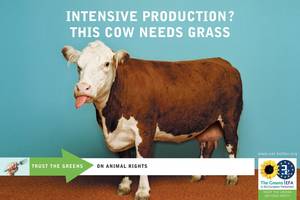Actualités
|
CAP Reform
1 crucial vote to beat the vicious circle of our food production system
This month's plenary session has two food-related issues on the agenda: the European Commissoin statement on the horsemeat scandal and the vote on the CAP reform. These issues once again raise serious questions about the functioning of our food system, but they are also opportunities to change the trend and finally listen to the ever-louder concerns of European citizens.
In his statement in plenary on Tuesday 12th March, EC Commissioner Borg underlined, through the recent horsemeat scandal, the problems inherent to the current food supply chain system which came to light in the mid 1990s with the discovery of mad cow disease (Bovine Spongiform Encephalopathy: BSE) and has been followed by successive crisis up to now. At the same moment, not that far from where Mr Borg stood, civil society organisations were preparing a day of action on ‘Farms instead of Factories’ ahead of the plenary CAP vote[1] on 13th March. Throughout the day, several hundred farmers and citizens from 12 countries, wearing colourful costumes, came together in Strasbourg to call for a greener and fairer CAP with a series of actions as MEPs held their final debate on the Common Agricultural Policy (CAP).
'As with any food related scandal, crisis and scare, we are due to learn lessons and if necessary consider appropriate changes in the light of experience'[2], indicated M. Borg in his statement on the horsemeat scandal. However, while the European Commission is asking for a reinforcement of control regulations, we have learnt from repeated experiences that calling for stricter and reinforced controls at every new food scandal is not enough[3]. Even if it seems that one problem can be resolved through short-term stricter rules and controls, the risks of the system remain and it never takes long for another food scandal to occur. The food industry involves ever longer travel distances and inspections and controls are often in the hands of the food industry itself.
Strict and regular controls along the food chain and severe sanctions must clearly be established to prevent further fraud. More independent controls and transparency on food information via ambitious origin labelling for all meats - including meat as ingredient in processed products - is also vital. But the European Commission, in its consideration of options to prevent the emergence of further food scandals, fails to take into consideration the fact that we have too many intermediaries in our food supply chain system.
The request of civil society movements supported by the Greens/EFA[4] for a real Green and fair CAP echoes this need for fundamental change. Only a fundamental reform of our agricultural and food system will effectively address the issue of a highly vulnerable food supply system, consisting of many points where the integrity of the food chain can break down, producing a scandalous amount of food waste (up to 30% of the food produced in Europe per year, i.e 100 million tons) and responsible for animal suffering and high level greenhouse gas emissions. The farm-to fork connection should be restored by prioritising and supporting regional, transparent and short-distance food supply chains, quality food at a fair price as well as local and seasonal products.
Recent EU decisions show that if we do not make the right choice for real change of our food system, food scandals will occur over and over again. The European Commission has just decided to reintroduce from 1st June 2013, animal protein meal made from non-ruminant animals for use as feed in fish aquaculture[5]. The Commission stated that this measure was a first step as it intends to propose a further measure to re-introduce the use of animal meal as feed for poultry and pigs. In other words, a process similar to the one that led to the mad cow disease in the 1990s is rehabilitated as if nothing had happened - animal feed from fallen animals and slaughter and forced cannibalism. On 12th February 2013, Member States approved a Commission measure to abolish the requirement for Member States (25 MS except for Bulgaria and Romania) to test healthy slaughtered bovine animals for BSE. Even if it is true that BSE prevalence is currently low in the EU (28 cases reported annually), for the Greens/EFA, it is crucial to continue collecting sufficient statistical data in order to allow for an early detection of the re-emergence of this disease and monitor atypical cases. But it looks as if the European food safety system is going backward on this point.
Greens/EFA MEPs wish to beat the never ending logic of food scandals. Therefore, as part of the CAP reform package, they made the following proposals to beat this vicious circle:
[1]http://www.arc2020.eu/front/2013/03/civil-society-gather-in-strasbourg-ahead-of-eu-parliament%e2%80%99s-final-cap-vote/ [2] http://www.bbc.co.uk/democracylive/europe-21749775 [3] /legacy/fileadmin/dam/Documents/Policy_papers/2013-2-19%20Horsemeat%20Green%20demands.pdf [4] http://www.greens-efa.eu/cap-reform-9316.html [5] http://eur-lex.europa.eu/LexUriServ/LexUriServ.do?uri=OJ:L:2013:021:0003:0016:EN:PDF and press release by José Bové: http://www.greens-efa.eu/farines-animales-9219.html
- support of shorter food chains, decentralised processing and local products through the rural development measures
- support for farmers' organisations so as to strengthen their bargaining position against the dominant market position of traders and supermarket chains
- adaptation of hygiene rules which currently favour industrial food systems and have destroyed decentralised food processing
- crop rotation including leguminous protein plants. This basic farming practice can counter and mitigate climate change thanks to lower use of chemical inputs and smash monocultures. It will also reduce the protein deficit and allow farmers to produce their own feed, with the aim being to replace soy imports
- change of public procurement rules to include criteria like seasonal, local and organic food in public and school refectories
- Guaranteeing support for rural development is also vital for strengthening short-distance food supply chains and quality local production
[1]http://www.arc2020.eu/front/2013/03/civil-society-gather-in-strasbourg-ahead-of-eu-parliament%e2%80%99s-final-cap-vote/ [2] http://www.bbc.co.uk/democracylive/europe-21749775 [3] /legacy/fileadmin/dam/Documents/Policy_papers/2013-2-19%20Horsemeat%20Green%20demands.pdf [4] http://www.greens-efa.eu/cap-reform-9316.html [5] http://eur-lex.europa.eu/LexUriServ/LexUriServ.do?uri=OJ:L:2013:021:0003:0016:EN:PDF and press release by José Bové: http://www.greens-efa.eu/farines-animales-9219.html






